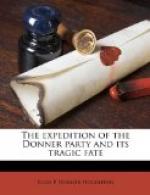Mr. Houghton was closely identified with pioneer affairs, and we had many friends in common, especially among officers and soldiers of the Mexican War. He had enlisted in Company A of Stevenson’s Regiment of New York Volunteers when barely eighteen years of age; and sailed with it from his native State on the twenty-sixth of September, 1846. After an eventful voyage by way of Cape Horn, the good ship Loo Choo, which bore him hither, cast anchor in the Bay of San Francisco, March 26, 1847, about the time the Third Relief was bringing us little girls over the mountains. His company being part of the detachment ordered to Mexico under Colonel Burton, he went at once into active service, was promoted through intermediate grades, and appointed lieutenant, and adjutant on the staff of Colonel Burton, before his twentieth year. Following an honorable discharge at the close of the war, and a year’s exciting experiences in the gold fields, he settled in San Jose in November, 1849, then the capital city. His knowledge of the Spanish and French languages fitting him specially therefor, he turned his attention to legislative and municipal matters. As clerk of the Senate Judiciary Committee of the first session of the California Legislature, he helped to formulate statutes for enactment, they being promulgated in Spanish as well as English at that time. During the period between 1851 and 1860 he held several official positions, among them that of president of the City Council; and on his twenty-fifth birthday he was elected Mayor of San Jose. Meanwhile he had organized the Eagle Guard, one of the first independent military companies in the State, and had also been successively promoted from adjutant to ordnance officer, with the rank of lieutenant-colonel, on Major-General Halleck’s staff of the State Militia. Moreover, he had completed the study of law in the office of Judge W.T. Wallace, been admitted to the bar, and was now actively engaged in the practice of his profession.
[Footnote 18: See Appendix for extract from The California Star.]
CHAPTER XXXVI
NEWS OF THE BRUNNERS—LETTERS FROM GRANDPA.
More than two years had elapsed since we had heard directly from Sonoma, when, on the day before Thanksgiving, 1860, Judge Robert Robinson and wife, of Sacramento, came to the ranch, and he, in his pleasing way, announced that he and Mrs. Robinson had a little story to tell, and a message to deliver, which would explain why they had arrived unexpectedly to spend the national holiday with us. Then seating himself, he bowed to his wife, and listened in corroborative silence while she related the following incident:




